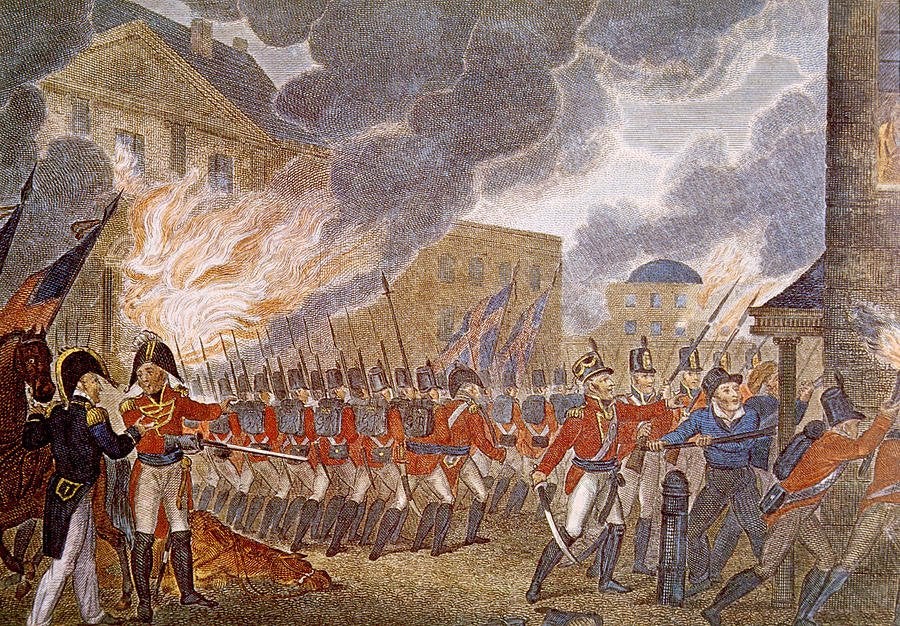Airliners crashing. Thousands dead. Immense buildings collapsing. Our greatest city brought to a halt. All air traffic stopped. Enough to explain the shock of that infamous day – and yet there is much more that explains why the shock was so great, and also why the effects have been so long lasting.
The United States is a historically fortunate country. Attacks on America have been exceedingly rare. Sometimes, of course, the enemy outsmarts you – whether it be the Imperial Japanese Navy at Pearl Harbor, who with their plan neutralized our entire massive military establishment in one fell swoop, or Al Qaeda on 9-11. The shock of 9-11 was even greater because at the time of Pearl Harbor, Americans were aware of growing hostility with Japan. We knew little of the thinking of Al Qaeda leader Osama bin Laden despite the fact that we were, and are, up to our strategic necks in the affairs of the Middle East. Our involvement led to his bloody attack, although we could hardly have foreseen all bin Laden’s justifications. He even cited the Sykes-Picot treaty of 1916, to which the United States was not even a party.
MORE: 9/11 Retrospective: Being Muslim in America Is Different Now From 2001
Our history of comparative invulnerability goes back a long way. The last time that someone launched a successful attack on the continental United States was ONE HUNDRED AND EIGHTY SEVEN years before 9-11. Two years after we launched the War of 1812, the British Army overran Washington D.C. and burned the public buildings. Fortunately for the American public, a few months later we slaughtered a British army at New Orleans (a month after the war was over, actually) so that the war seemed less disastrous than it had actually been. And if this war seems obscure – it is – we celebrate it every time we sing the “Star Spangled Banner.”
Most Americans then and later agreed with George Washington, who in his farewell address had warned us away from foreign entanglements. Had we followed that advice, there would have been no 9/11. Trouble was, the United States and the world changed in ways that our founder could hardly have foreseen. In the 19th century, the United States slowly started getting involved in world affairs, culminating in the 1890s with the annexation of the Philippines and Hawaii, and the building of a world class navy to protect our overseas trade. Even when World War I broke out, we were a very late entrant and never in any real danger.
[adrotate banner=”13″]
World War II was different, as our (again late) entry into the war was because of an enemy attack (Pearl Harbor) – but Pearl is almost as far from San Francisco as New York is, and many Americans did not even know that it was an American town. (Hawaii did not become a state until 14 years after World War II.) There was no real chance of a Japanese attack on the continental United States, nor was it part of Japanese strategy to do so.
Of course, the Cold War did expose America to attack – indeed, to annihilation. What is relevant to us today is that the Cold War led to a high degree of paranoia, and inevitably, conspiracy theories. Conspiracy theories had existed before, of course, particularly regarding Pearl Harbor, but those did not matter much, as the country was highly unified during the war, and we won a clear and decisive victory.
The Cold War was marked by “McCarthyism,” an attempt to root out Communist subversion. This did a lot of damage, as the definition of “subversive” was always vague, careers were ruined, and freedom declined. I remember well having to sign a loyalty oath when I joined Augusta College (as it then was) in 1991.
We also got more religious. “Under God” was added to the pledge of allegiance, and we became a majority church-going nation for the first time since colonial times. I mention these things to show the extent of the impact the Cold War had. However, no actual war touched American soil, and the only nuclear damage we experienced was what we did to ourselves.
So did Cold War paranoia simply carry forward into the post-9/11 era? For better or worse, we had a decade and half of comparative peace after the Cold War ended. How many of you really do remember the war in Kosovo? So, there was a subconscious expectation of a calm world when the morning of Sept. 11, 2001, dawned. This may help explain the intensity of the reactions at home.
The most visible totem of the 9/11 conflict – soon renamed the War on Terror – was the Patriot Act. This law made it easier for the government to spy on its own citizens, and it allowed all kinds of searches without warrants. Obviously, there is a constitutional problem there, but it is hard to challenge because the government can keep those searches secret. However, we have done this kind of thing before. The Quasi-War against France (1798-99) and World War I led to laws that effectively made it illegal to criticize the government. On the other hand, people today are much more aware of their constitutional rights, yet portions of the Patriot Act survive while others have lapsed without renewal.
[adrotate banner=”19″]
Paranoia inevitably leads to blame throwing and searching for enemies, especially in a conflict where the enemy is not very visible. For example, there have been fringe explanations somehow blaming Israel for the attack, bizarre to everyone except historians and Jews who know that sooner or later, any disaster around the globe will be blamed on Jews. A second, more wide-spread attitude is to blame all Muslims and attack American Muslims. Again, this is not without parallels. German Americans were attacked during World War I, and most Japanese Americans were imprisoned soon after the outbreak of World War II. Irish Americans, too, as far back as the Quasi-War during President John Adams’ administration. This is not only stupid; it is dangerous because we are highly dependent on information FROM American Muslims to alert the police to individuals with terror plans. They are positively the last group we want to alienate.
The weirdest theories of all have the towers being blown up by a conspiracy that placed explosives inside the buildings before the airplane collisions. One frequently cited argument is that jet fuel does not burn hot enough to melt the Towers’ structural girders. This is nonsense. The Technical University of Delft had been studying the possibility of airplane collisions with buildings for many years before 9/11. According to their model, the Towers stood much longer than expected, a tribute to its architect, Minoru Yamasaki. Yamasaki had taken airplane collisions into account, but airplanes had gotten much bigger since the 1960s. Incidentally, Yamasaki could have explained that even if a fire does not melt metal, it can warp and bend it …
Most important is the question of whether our current national disunity is in any way related to 9/11. I cannot give a clear yea or nay here, but I suspect that it does. The unity of 9/11 was deceptive and temporary. We were united when we were under attack, but there was no follow-up attack. We did attack the Taliban because the shielded Al Qaeda, but we soon overran Afghanistan – and then what? Invading Iraq yielded little unity. Also, 9/11 inevitably led to accusations of treason against groups and even whole political parties. But I suggest that the underlying cause is that we waged twenty years of war, albeit low level, without any clear result, except when bin Laden was turned into fish food.
Thinking about Afghanistan and especially Iraq should make us consider how we have changed our foreign and military policies. As a country with global commitments and the world’s most massive military, these are not minor issues. Here we encounter a paradox.
The 9/11 tragedy occurred because we are a global power. Our reaction was to extend our global reach. We waged two wars, the first in Afghanistan intending to destroy Al-Qaeda and overthrow the Taliban. This war has just ended as a result of actions taken by Presidents Trump and Biden. Yet, we still have a (small) presence in Iraq. Why were we there?
[adrotate banner=”54″]
One suggestion for a possible explanation is the Magnet theory. The official reasons for the invasion seemed rather thin. There was no connection between dictator Saddam Hussein and Al Qaeda, and while Hussein may have enjoyed 9/11, he had no role in it. The evidence for the “Weapons of Mass Destruction” argument was disputed from the beginning and, given how much pressure within the Bush II administration there was to produce it, the management must surely have known that it was on thin ice. It may have been just to overthrow Saddam using the War on Terror as an excuse, but then there was little reason to stay. The Magnet theory simply states that you use your military presence to draw enemies, including terrorists, into open battle, and then using our superior firepower to kill them. “W” at least once hinted at this as a value of the presence in Iraq. A secondary aspect of this theory is that you are fighting the enemy far from home instead of on your doorstep, which by itself is a strategy used throughout the centuries.
As far as military strategy and tactics go, did the 9-11 wars demonstrate that we had learned from the past, and did we show that we learned during those conflicts? As in every war, there were good and bad points. During two decades of war and occupation, the Pentagon managed to keep casualties low. In Afghanistan, for example, we lost only 115 men per year on average. No draftees were needed. As a result, perhaps, public protests were minimal. Diplomatically, we ensured that there was no active great power opposition. Whether we value the long occupations, we have shown that we can do it.
MORE: 9/11 Retrospective: People Sought Comfort in Their Faith In The Days Following the Attacks
Yet some problems continue to plague us. The soldiers became absolutely exhausted. Some were getting redeployed almost as soon as their leaves began. Many suffered and continue to suffer psychological problems as a result. This fits in with a second problem, namely that as a country, we are hopelessly overextended; it is interesting that both Presidents Trump and Biden took or are taking steps to remedy this. We are continually waging wars like this while also spending fortunes preparing for traditional major power wars, and at a certain point, this becomes unaffordable. But maybe the biggest disappointment in Afghanistan (the jury is still out on Iraq) is that we clearly failed to inflict meaningful lasting damage on the enemy or succeed in building up a stable opponent to that enemy. Even South Vietnam lasted two years after we left. Then and now, having a strong and stable local force is an absolute necessity. (I never understood why we abandoned the Kurds.)
Perhaps 9-11 should have made us more careful about believing in “stand-off” warfare – the idea that you can always react with lots of cruise missiles and bombing, supplemented by some ground forces, without taking any hits. And also, perhaps relying more on diplomacy and less on always turning to the military. This is not pacifism; this is wise use of resources, not to mention, survival.
Hubert van Tuyll is an occasional contributor of news analysis for The Augusta Press. Reach him at hvantuyl@augusta.edu.
[adrotate banner=”51″]












